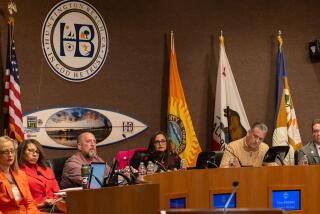HUNTINGTON PARK : Help for Parents of the Disabled
Luz Maria Fierto wasnât sure what to do when school officials said her 9-year-old daughter who has cerebral palsy no longer needed therapy and she disagreed.
Fierto, of Commerce, said she felt isolated until a friend told her about a workshop at the Huntington Park Public Library for parents of children with disabilities.
She was among 20 people who attended the free bilingual workshop at the library last week conducted by Team of Advocates for Special Kids (TASK), an Anaheim-based nonprofit information center that helps parents of children with disabilities.
âI was delighted by the workshop,â said Fierto, who plans to ask the school for additional help for her daughter.
Fierto listened as Mike McKelroy, a former Marine and coordinator for TASK, told parents what steps they can take to ensure that their children receive all the educational rights and assistance provided under state and federal law, including reviewing school records annually and requesting that the child be assessed for learning disabilities by school officials.
McKelroy says parents face a range of problems, including a child being labeled uncooperative by teachers, a lack of bilingual information, and a bureaucracy that can leave a child without help for months while paperwork is completed.
The workshop is part of an ongoing program sponsored by Timeline Community Link, a nonprofit group in South-Central that helps provide free information on social services and nonprofit agencies in poor communities.
âAs a lot of cutbacks are made (in social services) and case workers find themselves overloaded, we think parents need to be educated so they donât have to rely on just the caseworker to help them,â said Jean Franklin, executive director of Timeline.
There are currently 65,062 students taking part in special-education programs in the Los Angeles Unified School District, according to the districtâs 1993 state report.
McKelroy said children with disabilities are often never tested for things such as attention deficit or other problems until they reach middle school, when the child has fallen behind and feels alienated.
âIt never ceases to amaze me that we take for granted when someone, a teacher or whoever, says our child is lazy,â he said. âNo child is born lazy.â
Information: (714) 533-TASK.
More to Read
Sign up for Essential California
The most important California stories and recommendations in your inbox every morning.
You may occasionally receive promotional content from the Los Angeles Times.










